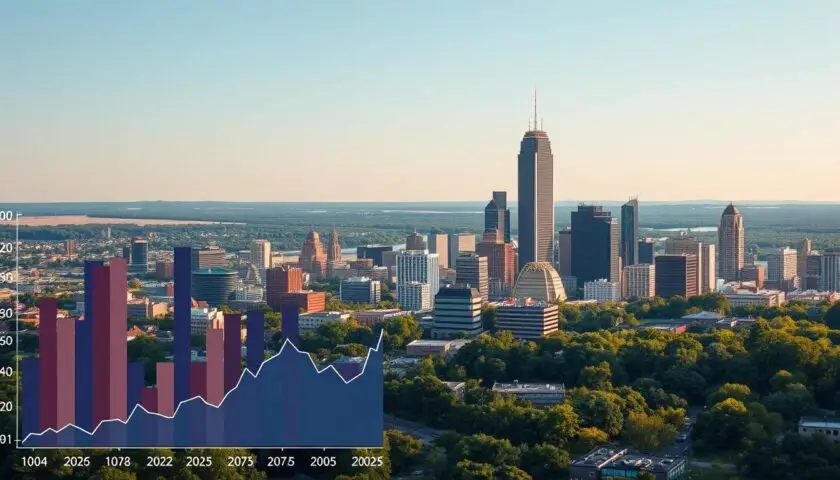By 2025, Charlotte’s population is expected to hit 923,164. The Charlotte metro area will see a population of about 2,321,000, growing by 1.3% each year. This growth shows the city’s strong economy and great living conditions.
It makes Charlotte a top choice for people and businesses. The city’s population growth is closely watched by city planners and businesses. They are eager to see how it will shape the future.
Key Takeaways
- Charlotte’s population is projected to reach 923,164 by 2025, with a growth rate of 1.3% annually.
- The Charlotte metro area’s population is expected to be approximately 2,321,000 by 2025.
- The city’s population growth is driven by its vibrant economy and attractive living conditions, making it a desirable destination for individuals and businesses, with a significant impact on the charlotte nc population 2025.
- The charlotte north carolina population projection suggests that the city will continue to experience steady growth, with a charlotte census data forecast that is closely watched by city planners and businesses.
- The city’s growth is expected to have a significant impact on its infrastructure, with concerns regarding gentrification and its impact on historically underserved communities, as well as infrastructure challenges such as traffic congestion, public transportation, and housing demands.
- The charlotte census data forecast is closely tied to the city’s economic development, with a strong economy and high average household income, with a median household income of $74,070, and an average weekly wage of $1,387.
- The city’s population growth is also driven by its high percentage of residents with a bachelor’s degree or higher, with 48.8% of the workforce holding a bachelor’s degree or higher, and 17% of the population having post-graduate degrees.
Current Population Trends and Historical Growth in Charlotte
Charlotte, NC, has seen a big jump in population lately. As of 2023, it has 911,311 people. The area around Charlotte, known as the Charlotte-Concord-Gastonia metropolitan area, has 2,805,115 people. This is a 15.33% increase from 2020 to 2023.
This growth is due to companies moving here and the high quality of life. The city is expected to keep growing, with a 3% increase each year. The cost of homes in Charlotte is now $420,000, up 2% from last year. Experts predict a 3-5% rise in home prices by 2025.
Historical Population Growth Patterns Since 2000
Charlotte’s population has been rising steadily since 2000. From 2020 to 2023, it grew by 4.2%, reaching 911,311 people. The area around Charlotte also saw a big jump, with a 15.33% increase in population.
Key Demographic Shifts in Recent Years
Charlotte’s demographics are changing. There’s a big demand for homes under $300,000, mainly from Millennials and first-time buyers. The median age in the US is 38.2 years, and the median household income is $64,994. The poverty rate is 12.8%, and the average household size is 2.6 people.
Major Factors Driving Charlotte’s Population Expansion
Several factors are driving Charlotte’s growth. These include companies moving here, a great quality of life, and a strong economy. The city’s location near major transportation hubs and diverse industries also play a role. As Charlotte grows, home prices are expected to rise by 3-5% due to demand and limited supply.
Charlotte’s population growth will impact its economy and infrastructure. The city’s population has grown by 15.33% since 2020. This growth is due to companies moving in and a high quality of life. It’s important to consider these trends when planning for Charlotte’s future.
| Year | Population of Charlotte, NC | Population of Charlotte-Concord-Gastonia Metropolitan Area |
|---|---|---|
| 2020 | 874,579 | 2,595,027 |
| 2023 | 911,311 | 2,805,115 |
Charlotte NC Population 2025: Comprehensive Forecast Analysis
The charlotte population statistics show a big growth trend. The city’s population is expected to grow in the coming years. The median age of Charlotte residents is 34.5 years. Also, 48.8% of the city’s workforce has a bachelor’s degree or higher.
Charlotte’s population is set to double in the next 25 years. This means the city needs to invest in infrastructure and urban planning. The growth rate, age distribution, and income levels are key to understanding this trend. Here’s a table with current demographic trends in Charlotte:
| Demographic Category | Current Trend |
|---|---|
| Median Age | 34.5 years |
| Education Level | 48.8% with a bachelor’s degree or higher |
| Population Growth Rate | Projected to double over the next 25 years |
Understanding Charlotte’s population trends is vital for planning its future. By looking at these statistics, we can see how the city will grow. This helps in planning for its infrastructure, economy, and residents.

Conclusion: Preparing for Charlotte’s Population Surge
The Charlotte, NC population is projected to grow to 4.6 million by. The city and its area must tackle the challenges and chances this growth brings. They need to invest in infrastructure, transportation, and affordable housing.
Neighborhoods like South End, NoDa, Ballantyne, Plaza Midwood, and University City are seeing big changes. Home prices range from $300,000 to over $1 million. This shows Charlotte’s ability to draw a wide range of people, from city lovers to suburban families.
The city plans to spend over $300 million on housing, transportation, and neighborhood upgrades. This money will help improve public safety, grow the workforce, and support arts and culture. It will also help make Charlotte more sustainable by encouraging electric vehicles and solar power.
By planning carefully and acting on these plans, Charlotte can make its fast growth work for everyone. It will create a vibrant, livable place for both new and long-time residents.
FAQ
What is the projected population of Charlotte, NC in 2025?
Charlotte’s population is expected to hit 923,164 by 2025. The metro area will have 2,321,000 people, growing 1.3% each year.
What are the current population trends and historical growth patterns in Charlotte?
Charlotte’s population has grown 5.41% since 2013. This shows steady growth. North Carolina’s population is set to hit 11.7 million by 2030, affecting the economy and infrastructure.
What are the key demographic shifts and factors driving Charlotte’s population expansion?
Charlotte’s median age is 34.5 years. The city boasts a highly educated workforce, with 48.8% holding a bachelor’s degree or higher. The region’s population is expected to double in 25 years, needing more infrastructure and planning.
What are the implications of the population forecast for Charlotte?
The rapid growth could open up business opportunities by boosting the consumer base and workforce. Yet, it also brings challenges like gentrification and infrastructure strain. These need careful planning and investment to manage.
Source Links
- https://nchstats.com/charlotte-population/
- https://www.osbm.nc.gov/blog/2025/02/03/nc-become-7th-most-populated-state-early-2030s
- https://qcitymetro.com/2025/01/24/charlotte-region-population-growth/
- https://explodingtopics.com/blog/fastest-growing-cities
- https://mecktimes.com/news/2025/01/09/charlotte-real-estate-market-2025-trends-predictions-and-data-driven-insights/
- https://theluxuryplaybook.com/charlotte-housing-market-analysis-forecast-2024-2025/
- https://robinhickmanrealty.com/charlotte-real-estate-forecast-for-2025/
- https://mecktimes.com/news/2025/01/08/the-evolution-of-charlotte-neighborhoods-where-to-buy-in-2025/
- https://www.charlottenc.gov/CS-Prep/City-News/FY-2025-Budget
I am Lazar Bojic, an established professional in digital marketing with almost a decade of experience. Specializing in an array of niches has been my main strength as a content creator. Besides being a content writer, I have participated in creating various other content types, including infographics and script writing for video content creators, across numerous niches. Among my standout works, content creation at wikibiography.in certainly holds a special place.

